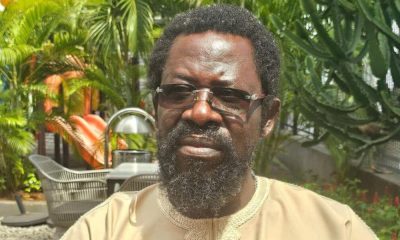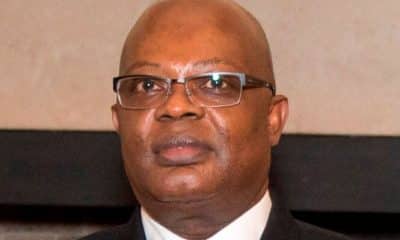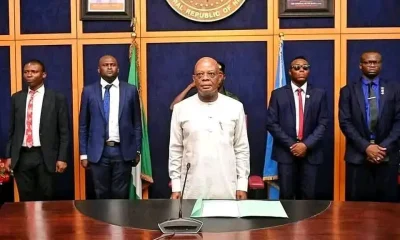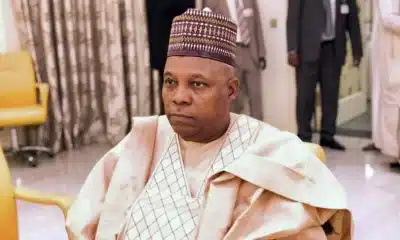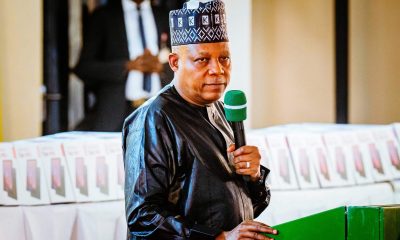Nigeria News
VP Shettima’s Take On Corruption, Federalism In Nigeria Faces Backlash From Afenifere, Ohanaeze Ndigbo, Others
![First Day In Office: See Inside Of VP Shettima's Office - [Photos]](https://www.naijanews.com/wp-content/uploads/2023/05/Shettima-in-Office-4-scaled.jpeg)
Several key socio-political organizations have expressed their concerns over Vice President Kashim Shettima‘s recent remarks regarding corruption and federalism in Nigeria.
These groups, including the Arewa Consultative Forum (ACF), the Middle Belt Forum (MBF), Afenifere, Ohanaeze Ndigbo, and the convener of the Niger Delta Self-Determination Movement (NDSM), Ann Kio Briggs, have offered varied responses to Shettima’s stance.
Naija News earlier reported that at a recent event, the 17th edition of the Leadership Annual Conference and Award, Shettima argued that corruption, rather than federalism, was Nigeria’s major problem.
He also criticized those who suggested that Nigeria’s federal system was not functioning, stating that no federal system worldwide was flawless. He went on to highlight the mismanagement of the nation’s resources as another key factor in Nigeria’s ongoing challenges.
Shettima further stated, “The problems we attribute to our federal system often stem from the poor management of what is already within our grasp, not from any inherent flaw in our constitutional architecture.”
He emphasized that the current administration is committed to reforming Nigeria’s federal system, with notable strides such as the pursuit of local government autonomy.
The Vice President called for a dialogue-driven approach to creating a federal system that aligns with Nigeria’s unique social, cultural, and demographic realities.
However, key political and ethnic groups have disagreed with the Vice President’s assertions.
Middle Belt Forum: The Federal System Fuels Corruption
The Middle Belt Forum, through its President, Bitrus Pogu, rejected Shettima’s position, arguing that the federal system itself was a major contributor to corruption.
He further explained that Nigeria’s federal system was not truly federal and that people from various regions felt disconnected from the state, which bred corruption.
Pogu called for a restructuring of Nigeria’s federal system as a solution to both corruption and the country’s broader governance issues.
He stated, “I am sorry to disagree with the position of the Vice President because the federalism we practice brought about the corruption he is talking about.
“If the system is not correct, that system gives birth to many things that are not correct.
“The federalism we practice is not true federalism and as a result, so many Nigerians from different sections of this country feel the country is indebted to them.
“Since the British handed power to us, many Nigerians feel that we have not yet become a nation. Some people do not even see corruption as corruption. They just see it as taking what you should have had which has been denied you and then you have the opportunity and you are taking it.
“First, all let us correct the structure, let there be true federalism. People will be committed to Nigeria, corruption will go, it is not the other way round.”
Ohanaeze Ndigbo: Federalism Is the Core Issue
Ohanaeze Ndigbo, a leading Igbo socio-cultural organization, also rejected Shettima’s claims.
The National Publicity Secretary of Ohanaeze, Ezechi Chukwu, argued that a proper restructuring of Nigeria’s institutions and political structure would help address corruption more effectively, pointing out that the current federal system does not give enough power to the federating units, leading to inefficiency and corruption.
Chukwu said: “It is not true that Nigeria’s problem is corruption rather than federalism because it is the anomalous present structure that incubates corruption in our polity.
“We need to get our institutions right before we can consider the ethical premises on which a nation is built. Nigeria needs to get the instructions right, we need to fix our polity from the foundation. When we get it right from the point of institutions and structure, it becomes easy to manage corruption.
“But now that we are operating based on the provision of powers from centrifugal forces without devolving powers, without giving room for fiscal federalism, without giving reasonable financial autonomy to the federating units, it is obvious that we can’t get it right because they ought to be unbundled.
“So in a nutshell, we have to get our foundation right. And the foundation in question here is the institutional federating structure.
“When we get it right, it becomes clear that Nigeria has an efficacious system that can enable it to manage its human, natural and resources.”
Afenifere: Restructuring Is the Key to Tackling Corruption
Afenifere, the pan-Yoruba socio-political group, aligned with Ohanaeze’s viewpoint, asserting that the lack of restructuring in Nigeria was a significant factor contributing to corruption.
Afenifere’s National Publicity Secretary, Jare Ajayi, said: “While we acknowledge the fact that corruption is a big problem in Nigeria, it is our position and conviction that if we restructure this country, so many problems confronting this country, including corruption will be addressed substantially.
“We urge the Federal Government to expedite action on restructuring. Corruption is a battle that may be ongoing but it should not be a reason for not restructuring. Restructuring, if properly done will be a one-off thing but corruption is systemic that cannot go away overnight. That is our position.”
Ajayi urged the federal government to prioritize restructuring, emphasizing that while corruption would remain a challenge, restructuring could provide a sustainable solution by decentralizing power and resources.
ACF: Government Plays a Major Role in Enabling Corruption
The Arewa Consultative Forum (ACF), when contacted by Vanguard expressed a similar sentiment, pointing out that the government itself was a major enabler of corruption.
ACF’s National Publicity Secretary, Professor Tukur Muhammad Baba, remarked, “There’s no doubt about the assertion. Corruption is in every facet of life, public, private, at the levels of social, economic processes and structures.
“The Vice President wasn’t saying anything new. The more fundamental thing is, with the admission and high and santimonious declaration, what is the Government that the Shetima is serving doing about to confront the problem head long? In fact, you can say that from glaring evidence, government is the biggest enabler of corruption, aided by everyone, operator of the system. It is very sad.”
Baba criticized the government’s inaction in addressing corruption, noting that despite acknowledging corruption’s pervasiveness, the current administration had yet to take effective steps to combat it.
Ann Kio Briggs: True Federalism Is the Solution to Corruption
Ann Kio Briggs, leader of the Niger Delta Self-Determination Movement (NDSM), also disagreed with Shettima’s analysis.
Briggs argued that while corruption was indeed a problem, the root cause was Nigeria’s failure to implement true federalism.
She said: “I disagree with the Vice President. Corruption is only part of our problems. What we need in this country is true federalism. This is what we have been fighting for many years. With true federalism, corruption will reduce drastically. It is only in such a situation that you can see a semblance of a good society.
“What we want is true federalism and it will in turn deal with corruption in its way. We want to control our resources so that we can use them to develop our region.”
Briggs emphasized that true federalism would enable regions to control their resources and promote local development, which, in turn, would mitigate corruption.

